5 Ways Netflix’s Master of None Is Saving the World—Or, At Least Saving Television


I’ve been a huge fan of Aziz Ansari’s Netflix comedy, Master of None, since its first season. However, if you’ve inhaled Season 2 like I have, you already know that this installment of Dev Shah’s story takes things up to a whole new level. What’s more, it’s exactly the kind of show that can contribute to saving the world. Or, at least saving television. **SPOILERS AHOY IF YOU’VE NOT YET WATCHED MASTER OF NONE S2**
After his break-up at the end of Season 1, Dev is single and has a life-changing time studying pasta making in Modena, Italy for several months. As was the case in Season 1, we walk with Dev (Aziz Ansari) as he tries to find love, but we’re also with him as he garners some greater success in his career. However, it’s the kind of success that’s financially lucrative, but doesn’t necessarily feed his soul. At the end of the day Dev, like all of us, wants to feel like a part of something bigger than himself in order to find fulfillment.
However, even more than was already the case in Season 1, it’s not just about Dev finding fulfillment. Ansari seems to be trying to give voice to the wants and needs of a diverse swath of New York characters. In addition to the diversity of voices, Master of None is also a platform for diverse ideas: about relationships, gender, sex, career, and aging.
Through the prism of this diversity, the show explores the very millennial fear of FOMO (fear of missing out) and how many thirty-somethings these days are struggling with needing to choose between emotional and financial fulfillment/success, and figuring out whether they’re making the right choices for their lives.
Here are five specific ways in which Master of None is single-handedly fixing television (and quite possibly making the world a better place in the process):
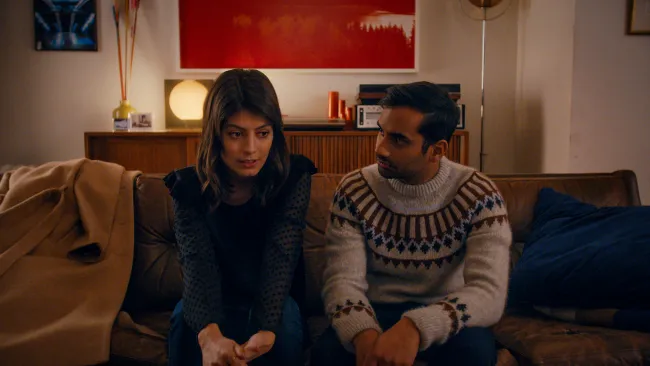
It’s a Dude-Focused Unapologetic Rom-Com
Usually, we’re all about having female-led projects all up in this piece. However, when it comes to media’s role in subverting gender roles, it’s equally important that there be alternative versions of male stories that don’t buy into the cookie cutter shoot-em-up-punch-it-in-the-face destruction narrative men are constantly fed. Master of None being a genuine romantic comedy from a male perspective is hugely important. People are doing a lot of comparing to Woody Allen (ugh), but in his projects, or a zom-rom-com like Shaun of the Dead, the films feel like they’re apologizing for being romantic comedies. They’re very much male movies.
This isn’t to say that Dev isn’t “acting male enough,” but the show makes no apologies for stereotypically “feminine” qualities. It is unapologetically sweet, and kind, and the characters (both male and female) are genuine and earnest when talking about their emotions.
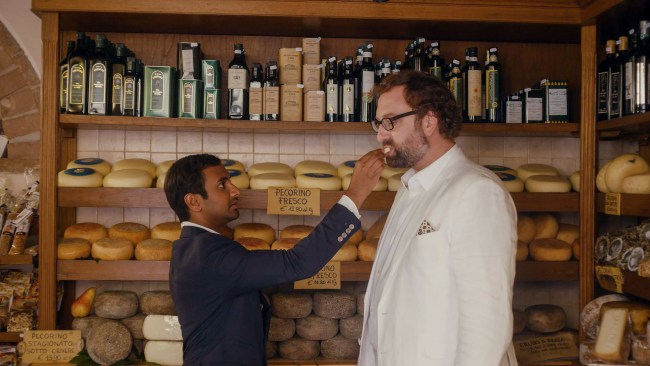
It Shows a Kind of Male Friendship We’re Not Used to Seeing on TV
When men are friends, they totally don’t sit around talking about their feelings. In fact, if we’re to believe what we see in media, men generally just grunt at each other and never talk about emotions at all. When they do talk about feelings, they make jokes about them, lest anyone think they’re actually talking about their feelings. All of that is true, right?
Dev and Arnold on Master of None shows us something else. These guys are plenty funny and snarky with each other, but it has nothing to do with covering up or apologizing for their emotional lives. When they’re sad or confused, they’re sad or confused, and they go to each other to figure stuff out.
When Arnold bemoans his ex getting married to someone who looks very much like him, Dev listens patiently and tries to make him feel better, then gently points out that Arnold has been on a dating app called “Hi Cuties” swiping on a full stable of women he’s been dating. He knows his friend, and he knows that as much as Arnold is lamenting the loss of this particular girl, he’s not actually looking to settle down just yet.
As Dev confronts his emerging feelings for Francesca, Arnold is an encouraging bud, but he also keeps it real and lets Dev know when he should pull back, or stop thinking about it.
And then there’s the unabashed fun they have together: singing theme songs about their favorite things, role-playing confessions of romantic feelings, Dev leaping into Arnold’s arms when he sees him after a long time away in Italy…these two are not shy about expressing how happy they make each other, and that’s amazing to watch.
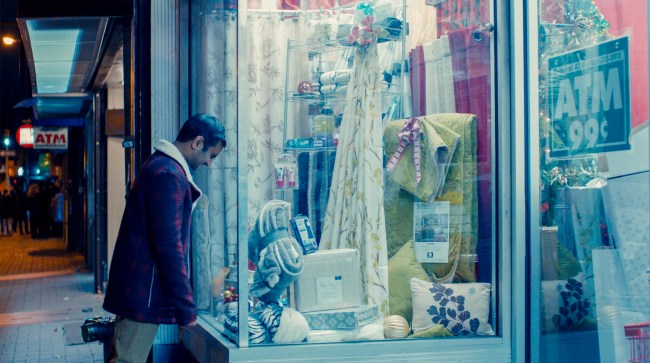
It Actually Portrays New York City As the Diverse Place It Is
So many TV shows are set in New York City, and as a native New Yorker, I always find myself getting pissed off by how white the shows often are. Granted, it’s very true that people tend to congregate and form friendships with people who are like them. Girls, for example, didn’t bother me because the four protagonists were white. There are plenty of all-white small groups of friends in New York. What bothered me was that damn near everyone else around them was white, too! I was like, “What New York are YOU living in?”
Meanwhile, Master of None does two things really well. First, it portrays Dev as having the mixed and inclusive friendships I experienced in New York. He has a “token white friend” in Arnold, a Korean friend in Brian, and his childhood bestie, Denise, who is a black lesbian. He also has Indian friends with whom he can commiserate. Dev doesn’t hang with one type of person. He regularly interacts with people from all over the racial and ethnic spectrum, because that’s how you do in New York.
Second, it portrays the wider diversity of the city. When Dev dates, he also dates all over the racial and ethnic spectrum. Season 2 found him dating and pursuing white women, black women, Indian women, etc. And then there’s the brilliance of Episode 6 of the season, “New York, I Love You.”
In this episode, we stray away from Dev and his friends and instead follow a diverse swath of random New Yorkers living their lives. There’s the Latino doorman who’s privy to way too many resident secrets. There’s the deaf couple in a store signing “loudly” to each other about their sex life to the point where the mother of a child who speaks ASL comes up to them to reprimand them for saying “vagina” so often (this segment had absolutely no sound, which was an added touch of brilliance). There was the African cab driver who sleeps in bunk beds in an apartment with four or five other dudes and they all go out for a night of clubbing and end up meeting a group of pretty women and hanging out all night after-hours at a fast food restaurant.
Master of None doesn’t give a crap about making New York “palatable for middle America” by whitening it up, or only showing an affluent New York. It shows New York as it is. I moved out to L.A. five years ago, and I’ve come to love it here, but Master of None makes me remember all the great things I loved about my hometown.
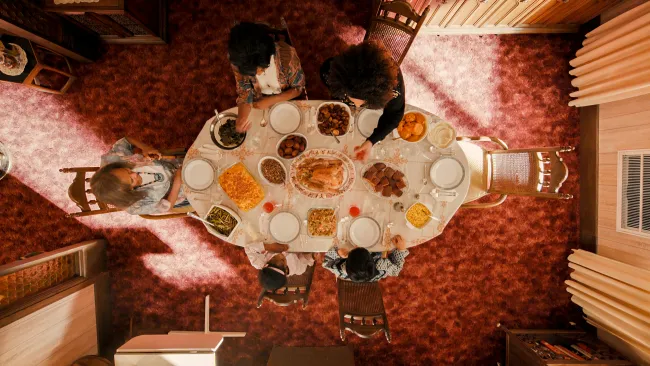
Master of None Zooms In on People and Things That Don’t Normally Get Attention
Rather than devote the entire 10-episode season to Dev’s search for love, Ansari chose to have standalone episodes that dig deeply into groups and situations that don’t normally get media attention. In addition to the aforementioned “New York, I Love You,” there was also the third episode of the season, “Religion,” which was entirely devoted to Dev and his family’s relationship with Islam as they are visited by devout relatives, and Dev’s dad demands that they put on a show of how devout they are while the fam is in town. Meanwhile, Dev’s young cousin wants to try pork for the first time. Dev lets him, and his cousin lets loose, wanting to go to a food festival and eat all the pork things. In the end, Dev must confess to his relatives that he’s not as devout as all that. At first, his mother is upset, not because she’s particularly devout herself, but because she sees Dev’s lack of interest in Islam as a failure in her parenting. Dev meets her halfway, and starts thumbing through the Q’uran. It’s a beautiful look at average Muslims engaging, or not engaging, in prayer and tradition, and navigating all of that in a way that I’m sure people from every religious tradition navigate those things. In fact, the episode starts with a series of children of all faiths being dragged to houses of worship against their will.
The masterpiece of the season was the episode “Thanksgiving,” which we’ve already talked a lot about. Here, we see a coming out experience for a woman of color, a rarity when so much gay media is devoted to the coming out stories of skinny, white men. An amazing performance by guest star Angela Bassett as Denise’s mom anchored a beautiful telling of Denise coming into her own as a queer woman. Over a series of Thanksgivings from the 1990s through todayin which Dev takes part every year, Denise comes into her own, eschewing dresses for baggy pants and baseball caps, realizing that her interest in hip-hop videos and Jennifer Aniston have more to do with her interest in women than it does with either hip-hop or Friends, and she eventually comes out to her mother and starts bringing girls home. Her mother, meanwhile, has that all-too-familiar push-pull of shock, and fear. Wanting her daughter to be happy, but also being afraid for what might happen to her. In the end, Denise and her mom end up solid when her mom sees her with a woman that’s actually good for her, and who actually makes her happy. And who doesn’t have a really obscene Instagram handle.
These two episodes in particular shine a spotlight on groups that deserve a spotlight, but rarely get one.
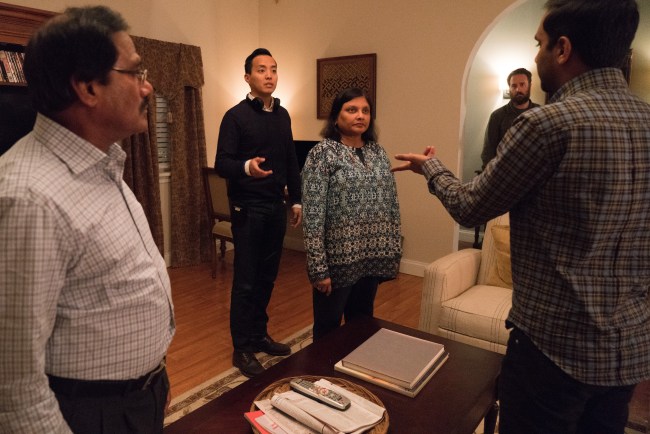
Let’s Hear It For Women and Older People!
One of the things I love about the character of Dev Shah is that he genuinely cares about women as people, and he’s not a person who’s dismissive of his elders. These are two things that don’t need one-off episodes at this point, because they’re baked into the DNA of the show.
One of the main storylines this season had to do with Dev’s latest gig hosting a show called Clash of the Cupcakes, which is Executive Produced by an Anthony Bourdain-inspired chef and TV personality named “Chef Jeff” Pastore (played brilliantly by Bobby Cannavale), who becomes a good friend of Dev’s, and gives him great opportunities, and who seems like a really cool, down-to-Earth dude…until it emerges that he’s all about sexual harassment. Dev has become friends with a female make-up artist on the show he ends up doing with Chef Jeff, and when she suddenly leaves the job, he finds her and asks her where she’s been. She tells him that Chef Jeff started getting really inappropriate with her, and that she wasn’t the first or the last.
Rather than not believing her and “siding” with his friend, he immediately gets uncomfortable and suspects that she’s telling the truth. It’s a small thing, but in a world where real-life women have trouble getting actual law enforcement to believe them about sexual harassment and assault, it’s important.
And then there’s Dev’s parents and Brian’s dad. Dev’s parents (played by Ansari’s real-life parents) were a standout in Season 1, and they are equally important to Season 2. In both “Religion” and in the episode “Door #3,” Dev’s dad plays an important role in teaching Dev the importance of devoting yourself to the things and people you love, even if it means doing things that are difficult (like pretending to be religious sometimes, or doing a TV show that isn’t exactly art). Dev’s mother is hard on him, but always lets him know that she’s proud of him and that she respects him as a person. Both parents are fully fleshed-out characters who are unique in the TV landscape.
Brian’s dad got a dating storyline this season and had to choose between two women he was seeing. The wonderful thing is that Brian talked to his dad about it enthusiastically. There wasn’t any sarcasm or eye-rolling involved, but rather, genuine interest and love. At first, Brian’s dad tried to have an open relationship with the two of them, which is certainly not conventional to portray on a TV show (especially in a media landscape that likes to pretend that older people don’t exist period, let alone have love lives), and then when they’re not into that, he at least gets to have a dog (which he may or may not have stolen from one of them).
Master of None treats all people with respect, and pays them the respect of giving their voices a platform. I desperately wish that more television shows would follow Master of None‘s example. This show proves that one isn’t sacrificing “being universal” when one chooses to be inclusive and culturally-specific. In fact, it’s being specific when it comes to race, ethnicity, body type, religion, ability, age, or class that allows a show to speak to more people.
Thank you, Netflix. And thank you, Aziz Ansari. Your world and media-saving efforts are appreciated.
(image: Netflix)
Want more stories like this? Become a subscriber and support the site!
—The Mary Sue has a strict comment policy that forbids, but is not limited to, personal insults toward anyone, hate speech, and trolling.—
Have a tip we should know? [email protected]